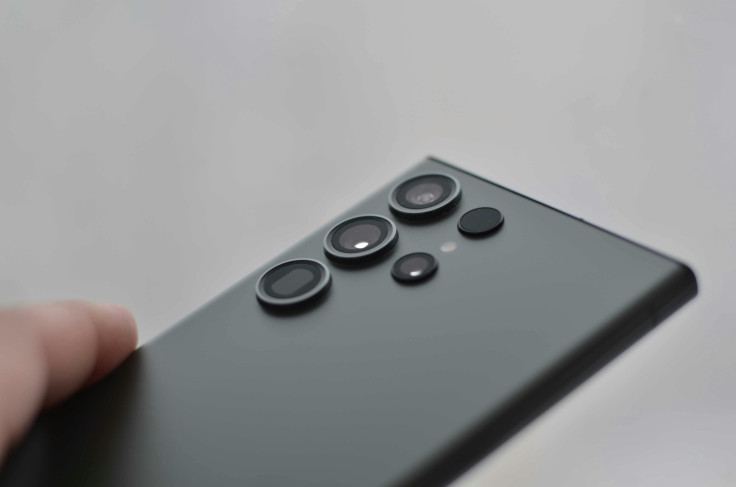Galaxy S26 Ultra Leak Reveals Privacy Display That Hides Your Screen — and a Major Camera Upgrade
Samsung's S26 Ultra has a massive camera bump, nearly doubling its predecessor's protrusion

The Samsung Galaxy S26 Ultra is not due for months, yet an early leak suggests the upcoming flagship will introduce two huge changes. Leaked code has uncovered a revolutionary, built-in 'Privacy Display' feature that prevents people from peering at your phone screen in public, eliminating the need for an external screen protector.
Coupled with information about a significant camera enhancement, this model is already shaping up to be one of the brand's most notable upgrades.
Although the Galaxy S26 Ultra's design might not undergo any dramatic changes, it's the display itself that's poised for a major improvement, one that would finally render privacy screen protectors obsolete.
What is Privacy Display?
Samsung is currently developing an integrated system for next year's Ultra model that can either darken the screen or obscure its information when needed, potentially marking a significant advancement over its current anti-reflective technology.
News surfaced last month about a new Samsung function, provisionally called 'Private Display', which is expected to deter people from viewing the screen, particularly when looking from the side.
The awe-inspiring part is that this Privacy Display is a digital feature, allowing users to switch the setting on and off, and even adjust the strength of the effect.
Limiting Visibility in High-Traffic Areas
Even better, the Privacy Display might activate on its own during specific moments, and we are now getting a first look at the possible user interface for this function.
Thanks to a rumoured One UI 8.5 leak shared by @achultra on X, we know the Galaxy S26 Ultra will include a setting that allows the Privacy Display function to switch on automatically in busy areas or public environments.
The leaked screenshot suggests that users can configure Privacy Display to trigger automatically when the phone detects it is being used in places like elevators or on public transportation. Furthermore, those using the Galaxy S26 Ultra may be able to select precisely which content remains visible when the Privacy Display is active.
The next S26 Ultra will have a privacy feature that keeps people from peeking at your screen. pic.twitter.com/tFcgeFpCqG
— Ach (@achultra) October 2, 2025
Currently, this includes being able to view your screen lock inputs, such as the PIN, pattern, or password. It will also give you the power to conceal certain private images that have been previously protected. This same functionality is designed to cover your notifications and any picture-in-picture windows.
The numerous references to the Privacy Display within the One UI 8.5 code suggest that Samsung is highly committed to the feature's launch, making it unlikely to be scrapped unless a significant quality control issue arises.
Android Authority suggests we expect to see the interface undergo several refinements and hope to learn more about the feature's comprehensive capabilities as the next Galaxy Unpacked event approaches, likely in early 2026.
Beyond the revolutionary display technology, leaked renders have also confirmed significant hardware changes, drawing attention to the Galaxy S26 Ultra's rumoured design alterations.
The S26 Ultra's Nearly Doubled Camera Bump
With the display innovations noted, attention shifts to the device's physical architecture, where leaked renders reveal a controversial new camera module paired with game-changing embedded privacy features.
Leaked measurements, primarily attributed to tipster Ice Universe, confirm a substantial physical redesign centred around the camera system. The Galaxy S26 Ultra's camera module is projected to protrude approximately 4.5 mm from the chassis, marking a nearly doubling of the thickness compared to the approximately 2.4 mm lens bump on the S25 Ultra.
Although the main chassis of the new Ultra may be thinner overall, the resulting bulk means the device's total depth at the camera island could reach 12.4 mm. Consequently, the phone's increased instability on flat surfaces will make a protective case a practical necessity to mitigate excessive rocking.
The Samsung Galaxy S26 Ultra's camera bump reaches 4.5mm (compared to 2.4mm on the S25 Ultra), driven by the large-aperture main camera and telephoto lens. Hopefully, the improvement will justify this increased thickness. Samsung could easily accommodate a larger telephoto sensor… pic.twitter.com/hyKT8KuHNn
— PhoneArt (@UniverseIce) September 9, 2025
The reason for the drastic increase in size is clear: Samsung needed more room for significantly upgraded camera hardware (details to follow). Renders of the S26 Ultra confirm a design shift from individual protruding rings to a vertical triple-camera layout enclosed within a compact, raised rectangular island.
However, this design direction is not without controversy. The pronounced, centralised camera block is reminiscent of 2021-era phones, prompting one prominent tech blogger to remark that the S26 Ultra looks 'positively ancient' next to its sleek predecessor due to this throwback module style.
Naturally, design is subjective: while some consumers may appreciate the cohesive new look, others will agree with the commentator who finds the large module "simply unappealing". Ultimately, Samsung appears to be prioritising internal function — such as a thinner main body, necessary thermal management, and superior optics — over the sleek, minimalist aesthetic of previous generations.
© Copyright IBTimes 2025. All rights reserved.






















